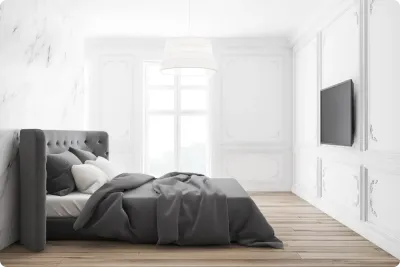
Key Takeaways
Watching TV in the bedroom is not ideal for sleep quality. For many people, it delays sleep onset, reduces deep sleep, and makes it harder to mentally disconnect at night. That said, the impact depends on how and when the TV is used.
- Watching TV before bed can interfere with melatonin production and delay deeper stages of sleep.
- The blue light emitted from screens keeps the brain in alert mode, making it harder to fully wind down.
- Having a TV in the bedroom may reduce quality time and communication between partners.
- Replacing TV with sleep-friendly habits like audiobooks, guided meditations, or ambient sound can support better rest.
- Creating a screen-free bedroom helps reinforce the mental association between your bed and sleep.
Deciding whether to place a television in the bedroom is a choice that many people face, often torn between the comfort of late-night entertainment and the pursuit of a restful, undisturbed sleep environment.
While the idea of cozying up in bed with your favorite show might seem appealing, the potential drawbacks of having a TV in your bedroom can significantly outweigh the perceived benefits. Understanding these cons and the advantages of maintaining a screen-free bedroom can guide you toward a healthier, more balanced lifestyle.
You’re not alone if there’s a TV in your bedroom—turns out, 64% of U.S. households keep one there. [1]
TV or No TV, Your Sleep Deserves Perfect Temp Control
Whether you fall asleep to late-night reruns or prefer a screen-free bedroom, one thing's for sure—temperature matters more than TV. The Chilipad bed cooling systems keep your bed at the perfect temp all night, so you sleep better no matter what’s on (or off) the screen.
Why Your Bedroom is Better Without a TV
Taking the TV out of your bedroom might seem small, but it comes with some surprisingly big perks. Here’s why ditching the screen could seriously upgrade your sleep space:
Improved Sleep Quality
Removing the TV from your bedroom can significantly enhance your sleep. Removing the screen will protect your circadian clock and natural sleep cycles, improve your overall sleep hygiene, and dodge blue-light interference from TVs and smartphones.
This encourages your body to increase melatonin levels, resulting in faster sleep and more profound, restorative sleep.
A screen-free environment encourages a natural wind-down routine, making it easier to transition from the busyness of the day to a restful night. This can lead to waking up feeling refreshed and energized, ready to tackle the day ahead.
Related Blog: How to Boost Your Sleep Hygiene
Fewer Distractions
A TV in the bedroom is a built-in distraction factory—between the endless “just one more episode” loop and the background noise; it’s tough to truly unwind. Removing the screen helps dial down the mental clutter, creating a calmer space that’s actually designed for relaxation, mindfulness, and, you know… sleep.
Without the constant pull of a screen, you’re more likely to spend your time intentionally reading, journaling, meditating, or anything else that actually supports your well-being. A distraction-free bedroom sets the stage for calm, making it easier to unplug, unwind, and ease into sleep mode.
Improved Relationships
Ditching the bedroom TV opens the door for real connection—no screens, no background noise, just quality face time (the kind that doesn’t involve an app). Without the constant pull of a show or movie, couples are more likely to talk, laugh, and share what’s actually on their minds.
Over time, this strengthens emotional bonds, boosts intimacy, and turns the bedroom back into a personal space made for connection, not just another streaming zone.
Encouragement of Healthier Activities
Without the constant lure of a TV, it’s easier to swap passive screen time for activities that actually boost your well-being—think reading, stretching, journaling, or even a quick evening walk. These habits do more than just fill time; they promote relaxation, reduce stress, and support a healthier, more balanced lifestyle.
Keeping your bedroom a screen-free zone opens up space for routines that help you truly wind down and recharge—no autoplay countdown, no endless scroll, just intentional downtime designed to support better sleep.
Enhanced Mental Clarity and Focus
A TV-free bedroom does more than just silence the background noise—it clears mental clutter, too. Without constant visual and auditory stimulation, your mind gets the space it needs to unwind, reflect, and process the day. That mental breathing room can spark creativity, sharpen problem-solving skills, and leave you feeling more grounded.
Your bedroom shifts from a second living room to a true retreat—a place to unplug, recharge, and escape the constant buzz of the outside world.
Sure, the convenience of a bedroom TV is tempting—but the trade-offs are real. Opting for a screen-free space prioritizes your health, strengthens relationships, and protects your mental clarity. It turns your bedroom back into what it was meant to be: a haven for rest, relaxation, and actual rejuvenation.
Why the TV in Your Bedroom Can Affect Sleep
A TV in the bedroom can interfere with sleep in a few key ways, even if it feels relaxing in the moment.
Light exposure from the screen can delay your body’s natural wind down process. Bright or flickering light signals alertness to the brain, making it harder to transition into sleep.
Mental stimulation also plays a role. Shows, news, or fast paced content keep your mind engaged when it should be slowing down. Even background TV can keep the brain in a more active state.
Over time, this can create conditioned sleep habits. When your bed becomes a place for watching TV instead of resting, your brain has a harder time associating the bedroom with sleep. That makes falling asleep take longer, night after night.
Together, light, stimulation, and habit conditioning can quietly chip away at sleep quality without you realizing it
Healthier Alternatives to a Bedroom TV
If you’re considering removing the TV from your bedroom or creating a tech-free zone, several alternatives can help you relax and unwind before bed:
- Reading: Light reading is a simple, sleep-friendly way to unwind. Keep a book or e-reader nearby for a calming activity that helps you power down—no screens, no noise, just better sleep on the horizon. Bonus points if the color of the light is a soft amber or red hue which is excellent for winding down.
- Meditation: It's a great way to dial down stress and ease into relaxation mode. Try a guided session or a meditation app to quiet your mind, fall asleep faster, and enjoy a deeper, more restful sleep.
- Journaling: This is a simple and effective way to reflect, unload your thoughts, and clear your mind before bed. Keep one nearby for a tech-free wind-down ritual that supports better sleep hygiene and helps you get a good night's sleep.
- Listening to Music: Calming music or nature sounds can set the tone for relaxation and restful sleep. A white noise machine or simple speaker helps create a soothing, screen-free vibe that’s perfect for winding down.
Final Thought
If sleep feels harder than it should, start by changing what your bedroom is used for. When your bed is reserved for sleep, your brain learns to switch off faster. While the allure of late-night entertainment may seem appealing, the potential drawbacks can significantly impact your sleep quality, relationships, and overall well-being.
You can make a more informed choice by understanding the cons of having a TV in your bedroom, such as disrupted sleep patterns, distractions from intimacy, and the promotion of a sedentary lifestyle.
Opting for a TV-free bedroom offers numerous benefits that sleep experts say can enhance your quality of life and health. Improved sleep quality, fewer distractions, stronger relationships, encouragement of healthier activities, and enhanced mental clarity are just a few of the advantages that come with creating a serene, screen-free sleep sanctuary.
Ultimately, prioritizing a restful environment that fosters relaxation and connection can lead to a healthier, more balanced lifestyle. By embracing the idea of a TV-free bedroom, you not only invest in your sleep and well-being but also cultivate a space that nurtures meaningful interactions and personal growth.
So, consider making the switch and transforming your bedroom into a true haven to get a good night's sleep.
Frequently Asked Questions: TVs in Bedrooms
Why Do People Like Having a TV in the Bedroom?
Convenience, comfort, and habit. Many use it as background noise, a wind-down tool, or even a sleep aid—despite the hidden sleep sabotage it brings.
What Are the Health Risks of Watching TV in Bed?
Exposure to blue light from the TV can delay:
- Delays Sleep: Blue light tells your brain it’s party time, not bedtime.
- Reduces REM Cycles: Less deep dreaming means less brain and body recovery.
- Increases Risk of Insomnia: The more you binge, the more your sleep schedule unravels.
- May Contribute to Weight Gain: Poor sleep messes with hunger hormones and metabolism.
- Kills Next-Day Focus: Foggy mornings and sluggish thinking? Blame the screen glow.
What Are the Best Alternatives to Watching TV Before Bed?
Try these healthy swaps for your late-night Netflix habit:
- Read a book (paper > e-reader)
- Listen to calming music or a sleep podcast
- Try meditation or guided breathing apps
- Journal your thoughts
- Use a non-wearable sleep tracker to monitor wind-down routines
Is it bad to have a TV in the bedroom?
For many people, yes. It can delay sleep and reduce sleep quality.
Does falling asleep with the TV on affect sleep?
Yes. Light and sound can fragment sleep even if you stay asleep.
Source Type: Industry Research Report
Key Insight: Analyzes how households with multiple televisions increase access to media and viewing flexibility, reflecting broader trends in screen exposure and content consumption habits.
View Resource
Source URL: https://www.nielsen.com/insights/2022/rooms-with-a-view-multiple-set-tv-households-provide-an-array-of-access-and-choice-for-content-hungry-viewers/









